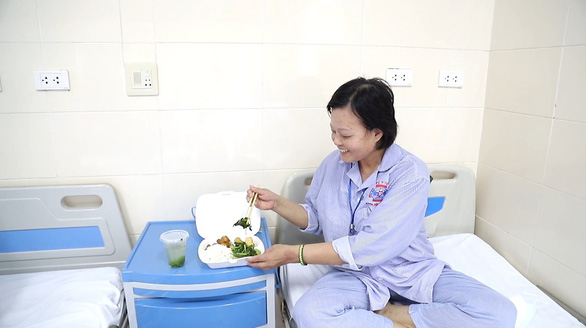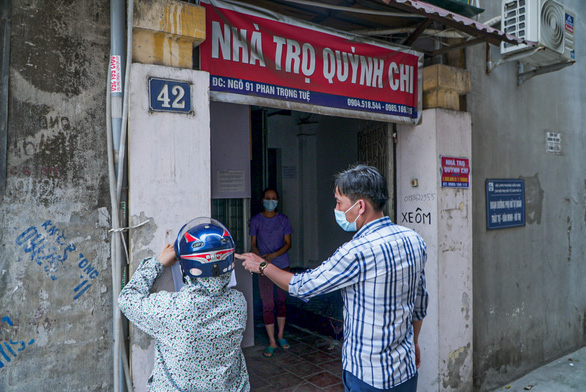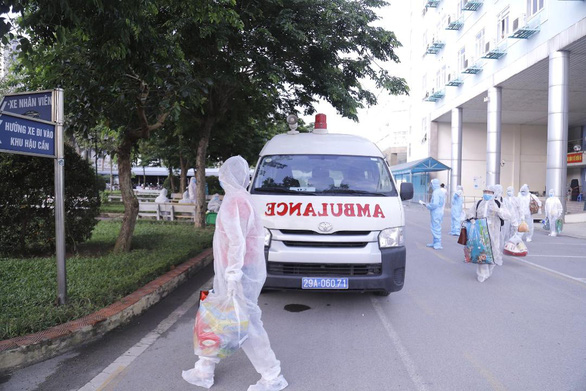The mandate came as a shock to both patients and staff at the hospital branches, leaving many patients without support or care after family members were locked out of the wards.
With isolation and struggles against pre-existing conditions on their shoulders, patients at K Hospital are doing their best to maintain their daily regimen and keep their faith in the doctors and nurses that work day and night to keep them safe.
The hospital is among a dozen others nationwide that are being isolated over their links to a lot of local coronavirus infections recorded in this fourth wave, which started hitting Vietnam on April 27.
The Southeast Asian nation had spent roughly a month finding no case in the community.
Upended routines
Staff at K Hospital were alerted to news of a lockdown in the small hours of May 7, with some less surprised by the restriction than others.
“Most of us had already brought clothes and necessities to the hospital to prepare for this kind of scenario,” said Dr. Nguyen Ba Tinh, K Hospital’s head of social affairs.
Since that lockdown came into effect, Tinh’s workload has increased tenfold.
In addition to his typical responsibilities, he has had to quickly learn how to effectively run communications and correspondence between patients and family members who need to see one another but are unable to.
“We have to tend to each patient’s condition while also sampling them for COVID-19 testing,” said Dr. Tinh.
“Every caretaker and staff member must be tested as well.
“I have to wear full PPE all day, which is unpleasant in this hot weather, especially since our air conditioners are turned off [to prevent transmission].”
|
|
| A patient has her meal at the Vietnam National Cancer Hospital in Hanoi. Photo: Ha Tran / Tuoi Tre |
With nearly 1,500 patients and a similar number of caretakers stuck inside the premises, doctors are juggling dozens of variables to figure out treatment for each case and making tough decisions about who to prioritize for the hospital’s currently limited capacity.
Meanwhile, other departments, particularly the hospital’s kitchen, have found themselves getting stretched thinner by the day.
During the first days of the lockdown, the kitchen provided over 10,000 meals per day for just the K Hospital branch in Tan Trieu Commune, Thanh Tri District, placing each meal in front of a door before a designated resident is able to bring it inside.
Beds in the facility are reserved for patients and family members, with doctors and nurses catching sleep at their desks or on vacant chairs.
According to Tinh, support from the outside community has been overwhelming, with many having called the hospital to check on conditions and offering to send much needed supplies, such as retractable beds, blankets, and even ruoc (pork floss) and muoi vung (crushed sesame and salt) to spice up the rice served to the doctors inside the quarantine zone.
|
|
| An outpatient at the Vietnam National Cancer Hospital in Hanoi self-isolates in a rented room nearby. Photo: Pham Tuan / Tuoi Tre |
Life outside quarantine zone
While nearly 4,000 individuals are locked in quarantine inside the facility, many outpatients at K Hospital, despite being permitted to rent rooms outside of the isolation zone, have found themselves struggling to navigate life during the lockdown mandate.
Xin Van So, a 55-year-old nasopharynx cancer patient in treatment from Ha Giang Province, has found himself essentially trapped in a tiny dorm room near K Hospital’s Tan Trieu branch after COVID-19 measures put in place by Hanoi authorities prohibited him from returning home.
“Daily life has become a struggle,” So shared.
“Most of the shops in the area are closed so it is quite hard for me to find food and I didn’t really have time to prepare anything because it all happened to fast.”
The combination of Hanoi’s broiling heat and the cessation of his cancer treatment due to the lockdown has left So feeling dispirited and unsure about his future.
Back at home, So’s family has become solely dependent on his wife and her few acres of rice paddy. His two children are currently unemployed.
“Cancer treatment is expensive,” he said.
“My rented room cost me VND3 million [US$130] per month, not to mention the price of the medicine.”
For now, So’s only wish is for the COVID-19 wave to settle so that he and other cancer patients can resume their treatment regimen and prepare to return home.
|
|
| A facility belonging to the Vietnam National Cancer Hospital in Hanoi is put under lockdown after a COVID-19 cluster was detected there. Photo: Ha Tran / Tuoi Tre |
Maintaining hope
Since the beginning of the lockdown mandate, officials at K Hospital have been holding live Q&A sessions with patients via the Internet, some of which have garnered millions of views.
A huge portion of the viewers are patients and family members eager to find out about the hospital’s operations and daily life in lockdown.
To better inform the quarantined residents, the hospital issues multiple radio updates per day which detail testing progress and case transfers.
For the radio reports, doctors and practitioners step up to take on the roles of news anchors and disc jockeys, delivering useful information and relaxing music to lull patients to sleep.
|
|
| A facility belonging to the Vietnam National Cancer Hospital in Hanoi is put under lockdown after a COVID-19 cluster was detected there. Photo: Ha Tran / Tuoi Tre |
In the days ahead, K Hospital will begin sending out notices to local authorities when quarantined people begin to return home on May 21 and new patients can be taken in and cared for.
After a daily spike of 11 COVID-19 infections on May 7, the daily case count at the hospital has never grown larger than one digit.
Practitioners maintain their optimism on eventual success in containing transmission at the premises.
“The days in lockdown are definitely special because we can experience the love and support that the community sends our way,” Dr. Tinh told Tuoi Tre (Youth) newspaper.
“We are looking forward to a day of reopening.”
Like us on Facebook or follow us on Twitter to get the latest news about Vietnam!







